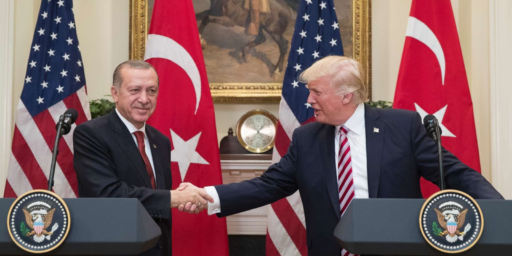The Complexity of Genocide
The Holocaust was a very atypical case of genocide.
Georgetown PhD candidate Nick Danforth takes to Foreign Policy to lament “The Armenian Genocide’s Samantha Power Problem,” the subhed of which is “The United States cannot stop genocide as long as policymakers and human rights advocates stick to black-and-white narratives.”
[A]s we prepare to commemorate the Armenian genocide on its April 24 centenary, we should also reflect on the risks of reducing history to simple morality tales. When U.S. bureaucrats use the ambiguity of events in Bosnia to excuse their inaction, or when Turkish denialists use the complexity of what happened in 1915 to whitewash Ottoman atrocities, creating the clearest possible counternarrative can seem like a moral duty. But in detailing the efforts by President Bill Clinton’s administration to avoid taking action in Yugoslavia, Power inadvertently shows why confronting ambiguity, rather than ignoring it, can make rationalized indifference less likely to win out in the future. Understanding the more complex history of the Armenian genocide doesn’t diminish its horror or absolve its perpetrators. Instead, it gives us a firmer foundation for confronting genocide today and tomorrow by preparing the public for the fact that evil and ambiguity can coexist.
[…]
Until recently, Turkish pressure made it difficult for all but a few historians to publicly acknowledge the genocide while also presenting it in context, complete with a more thorough account of Ottoman motivations that includes the reality of systematic violence against Ottoman Muslims as well. This full version of history angers not only Turkish nationalists, long bent on denying any evidence of their country’s wrongdoing, but also many Armenians, who believe that evidence of Christian crimes against Turks negates the purity or even reality of their victimhood. As a result, Turks claim that what happened in 1915 was war, not genocide. And Armenians, with understandable anger, respond that it was genocide, not war.
In fact, almost every scholarly treatment of the subject makes clear that genocide is quite frequently committed in the context of civil war or insurrection and often has frighteningly “rational” motives for parties in these conflicts. In Rwanda, Darfur, and Bosnia, to name just a few examples, war and genocide were closely related, as militarily weak states engaged in what they believed to be existential conflicts against internal enemies.
The Holocaust differed from this pattern. The internal enemy existed only in the Nazi’s anti-Semitic imagination, which is why it often proves such a troubling reference point in Armenian-genocide debates. It becomes clear in countless Turkish statements that the unique outrage over the word “genocide” is often over the implied comparison to the Nazis. Armenian rhetoric, in turn, can exacerbate this comparison, suggesting, for example, that for Turks to be angry about crimes committed against their ancestors is equivalent to Germans mourning the soldiers killed in the Warsaw Uprising.
Danforth, who is writing his dissertation on the topic, recounts the complexities of the case:
The real history of the Armenian genocide is far messier than the story conveyed by casual Holocaust comparisons or books like A Problem from Hell. Throughout the course of the 19th century, the Ottoman government lost territory to Christian nationalist movements in the Balkans — Greeks, Serbs, and Bulgarians. When these nations became independent, often following brutal fighting, their new rulers sought to create ethnically pure states, usually by killing or expelling as many Ottoman Muslims as they could. When Bulgaria became independent in 1878, for example, hundreds of thousands of Muslim civilians fled, with as many as half of them dying along the way.
Before World War I, a small number of Armenians, living in the eastern portion of what was left of the Ottoman Empire, had begun to form revolutionary groups seeking independence. These separatists did not command widespread support among the Armenian population, certainly not to the extent portrayed in modern Turkish propaganda. But for Ottoman leaders who had seen small nationalist movements in the Balkans grow into insurmountable rebellions, chipping away at their empire with European support, the pattern appeared all too familiar. In this context, destroying the empire’s Armenian population became an obvious, if brutal, way to prevent this pattern from repeating itself. With the Armenian nation crippled, they reasoned, there would never be an Armenian state formed from Ottoman territory. Thus the Ottoman leaders’ subsequent genocide campaign elevated to the level of systematic state policy the kind of mass murder they had seen carried out on a smaller scale against their people by Balkan Christians. And as the fortunes of World War I shifted and Russian troops advanced into Ottoman territory, this cycle of violence continued, with Armenian militias’ atrocities against Muslim villagers living on in Turkish memory today.
Even in its abbreviated form, this history helps demonstrate how internal conflict served as a motivation for genocide, not grounds for denying or justifying it. Yet the idea of genocide as something incompatible with other forms of internal conflict remains widespread.
The takeaway isn’t that, because the reality of most genocides is more complex than the iconic case of the Nazi Holocaust, we should do nothing. Rather,
The best way to prevent future administrations from using these same platitudes as excuses is to recognize that officials who talked about atrocities on all sides were often right about their facts and wrong about their conclusions. Faced with future atrocities, policymakers may well claim that unlike previous, clear-cut examples of genocide — unlike the version of the Armenian genocide we all remember — this time things really are complicated. Realizing things have always been complicated leaves us better prepared to confront these rationalizations and explain to policymakers that a complex reality must not be an excuse for inaction. History can provide future activists and advocates with evidence that almost all the situations where Americans now agree their country should have done something looked, and really were, far messier at the time.
In many cases, people are understandably hesitant to talk about the atrocities on all sides for fear that this will lead to victim-blaming or exculpate the perpetrators. But the more directly we confront the issue, the more quickly this fear abates. No details that emerged in the trials of Croatian war criminals have made Slobodan Milosevic appear any less evil. And in Turkey, many of those who regularly wield the atrocities of Armenian guerrilla groups as some sort of moral trump card come up short when asked to explain how this justified murdering hundreds of thousands of women and children.
Guilt and innocence can seldom be neatly appropriated along national or political lines. But acknowledging this does not diminish the innocence of civilian victims or the guilt of the state officials who orchestrate mass murder. This distinction alone is enough to give genocide its horror and should be reason enough for the U.S. government to act in defense of innocent lives.
Now, I seldom think “act in defense of innocent lives” means that the United States has a duty to militarily intervene in civil wars. The ultimately-successful interventions in Bosnia and Kosovo—the former in particular—were possible only after years of fighting had created the conditions for partition. And, to this day, I don’t know how we would have stopped the horrors in Rwanda and Darfur. But Danforth’s larger point—that the mere fact that the situation is complicated doesn’t preclude describing the wholesale slaughter of civilians as “genocide—is correct. I’m comfortable describing the Armenian Genocide as “genocide” even though Armenian political leaders also committed unspeakable crimes. Likewise, while most of us understood even as events were unfolded that there “were no good guys” in the Bosnia mess, that by no means justifies targeting noncombatants.






It is worth noting that Raphael Lemkin, the man who coined the word “genocide” in the 1940s, had the Armenian Genocide specifically in mind, second only to the Holocaust. In fact, it was what first got him interested in the subject long before the Nazi Holocaust even occurred.
I fail to see the advantage to US interests to make a stand one way or another. Turkey is our NATO ally and therefore more important than a symbolic political stand concerning Armenia. It is best to stay silent.
So it ends with a very Christian lesson, as elucidated in the Brothers Karamazov, “Everyone is guilty for all and before all.” Neither wants to admit to wrongdoing in the past while also decrying the wrongdoing of others in the past.
It’s not very complex when it comes down to it, it just takes a while to explain. 🙂
Kill them all and let God sort it out.
… too soon?
@Scott: if our interests are narrowly defined as keeping the Turks happy and comfortable, then yes, we should say nothing. But if we take the moral stand that genocide is wrong, then we cannot flinch away from describing it as what it is, and we should try to understand how it happens, so we have a better chance of preventing it when we can.
That said, I do wonder if the Turks refer to the treatment of Native Americans by the US as genocide.
@Gustopher:
Well, what purpose does ‘not flinching’ really serve? Should the Turks not also then get to label what the Bulgarians and the Greeks did to Muslim (Turkish, Greek or Slavic) populations “genocide” (objectively it would seem to be the case) – and if they do, is any real purpose served? (Or indeed yes, your Americans fine and gentle treatment of Native Americans…, let us limit it merely to the 19th century).
The historical label is one thing.
Taking political decisions as a State to label an event not in one’s wheelhouse, and over a century past…. quite another.
This gets into the realm of pointless political posturing (which the ideologues do adore, Left and Right, although this seems more of the wooly headed Left variety) but serves no real purpose. Frankly it is laughable to think that anything will be achieved in real terms from going back in history and have parliaments “recognize” anything.
Current events, that is another matter, but this is politics as empty theatrics.